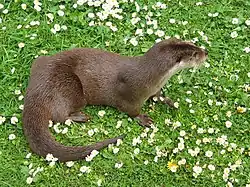Otter
English
Pronunciation
- (Received Pronunciation) IPA(key): /ˈɒt.ə/
- (General American) enPR: ŏtʹər, IPA(key): /ˈɑtɚ/
Audio (Southern England) (file) - Homophone: odder (US)
- Rhymes: -ɒtə(ɹ)
Proper noun
Otter
- A river with its source in the Blackdown Hills, Somerset, and which flows through Devon, to Lyme Bay in the English Channel.
Related terms
- Otterford
- Otterhead
- Ottery St Mary
German
Pronunciation
- IPA(key): /ˈɔtɐ/
Etymology 1
From Middle High German otter, from Old High German ottar, from Proto-West Germanic *otr.
Declension
Derived terms
- Fischotter m
- Seeotter m
Etymology 2
From early New High German nō̆ter, eastern secondary form of Middle High German nāter, from Old High German nātara. Originally the same word as Natter “colubrid”, which see.
The form is based on the common dialectal development -ā- → -ō- with subsequent irregular shortening. Loss of initial n- is a common development in the Germanic languages and is due to metanalysis, i.e. the unetymological segmentation of preceding endings or articles, for example: *eine notter, dialectally *en notter → *en‿otter. The same happened in Dutch adder and English adder. The German form was spread by Luther.
Usage notes
- At least outside of scientific parlance, this word is chiefly restricted to compound words, to avoid confusion with Etymology 1.
Declension
Derived terms
Saterland Frisian

Etymology
From Old Frisian *otter, from Proto-West Germanic *otr. Cognates include West Frisian otter.
Pronunciation
- IPA(key): /ˈɔtər/
- Hyphenation: Ot‧ter
Derived terms
References
- Marron C. Fort (2015) “Otter”, in Saterfriesisches Wörterbuch mit einer phonologischen und grammatischen Übersicht, Buske, →ISBN